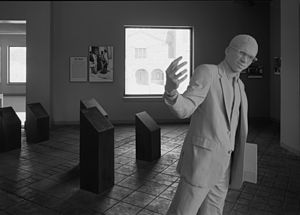Birmingham Civil Rights Institute
This article includes a list of general references, but it lacks sufficient corresponding inline citations. (July 2011) |

Birmingham Civil Rights Institute is a large interpretive museum and research center in Birmingham, Alabama that depicts the struggles of the Civil Rights Movement in the 1950s and 1960s. The Institute is located in the Civil Rights District, which includes the historic 16th Street Baptist Church, Kelly Ingram Park, Fourth Avenue Business District, and the Alabama Jazz Hall of Fame located in the Carver Theatre. The Institute opened in November 1992, and had more than 25,000 visitors during its first week.
The Institute showcases a walking journey through the "living institution", which displays the lessons of the past as a positive way to chart new directions for the future. The permanent exhibitions are a self-directed journey through Birmingham's contributions to the Civil Rights Movement and human rights struggles. Multimedia exhibitions focus on the history of African-American life and the struggle for civil rights. The Oral History Project, one of the museum's multimedia exhibits, documents Birmingham's role in the Civil Rights Movement through the voices of movement participants. The museum is an affiliate in the Smithsonian Affiliations program. Through this program the museum can acquire long-term loans and is currently hosting the Smithsonian Institution Traveling Exhibition Service exhibition "Let Your Motto Be resistance."[1]
The archives of the Institute serve as a national resource for educators and researchers. They are a repository for the collection and preservation of civil rights documents and artifacts. The archival information system is computer-linked to the Birmingham Public Library and is a vital component of the Archives Division.
The Birmingham Civil Rights Institute is also a community resource for meetings, seminars and workshops. A Community Meeting Room is available to local organizations.
The museum is a member of the North American Reciprocal Museums program.
On May 24, 2013, President Barack Obama signed into law H.R. 360 from the 113th United States Congress, a bill which awarded the Congressional Gold Medal to Addie Mae Collins, Denise McNair, Carole Robertson, and Cynthia Wesley to commemorate the lives they lost 50 years ago in the bombing of 16th Street Baptist Church.[2] The gold medal was given to the Birmingham Civil Rights Institute to display or loan out to other museums.[2]
On March 21, 2016, Rep. Terri Sewell introduced to the United States House of Representatives H.R. 4817, a bill that would designate the Birmingham Civil Rights District, including the Civil Rights Institute, as a National Park. On March 28, 2016, the bill was referred to the Subcommittee on Federal Lands.[3]
See also
- Congressional gold medal award to victims of the 16th Street Baptist Church bombing (H.R. 360; 113th Congress)
- Birmingham Civil Rights National Monument
- National Civil Rights Museum
- National Voting Rights Museum
References
- ^ "Birmingham Civil Rights Institute". Local News. Affiliate Details. 2011. Retrieved 15 Jul 2011.
- ^ a b "H.R. 360 - Summary". United States Congress. Retrieved 30 May 2013.
- ^ "H.R.4817 - Birmingham Civil Rights National Historical Park". Congress.gov. Retrieved 12 April 2016.
External links
- Civil rights movement
- History museums in Alabama
- Institutions accredited by the American Alliance of Museums
- Museums in Birmingham, Alabama
- History of Birmingham, Alabama
- Landmarks in Alabama
- African-American museums in Alabama
- Research museums in Alabama
- Smithsonian Institution affiliates
- African-American civil rights movement (1954–68) museums
